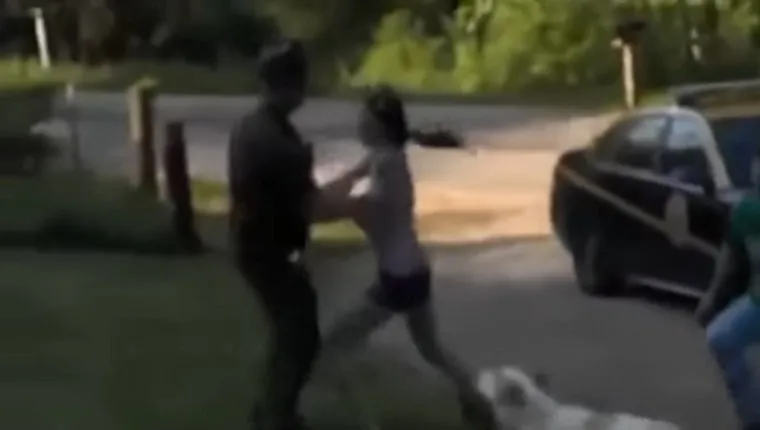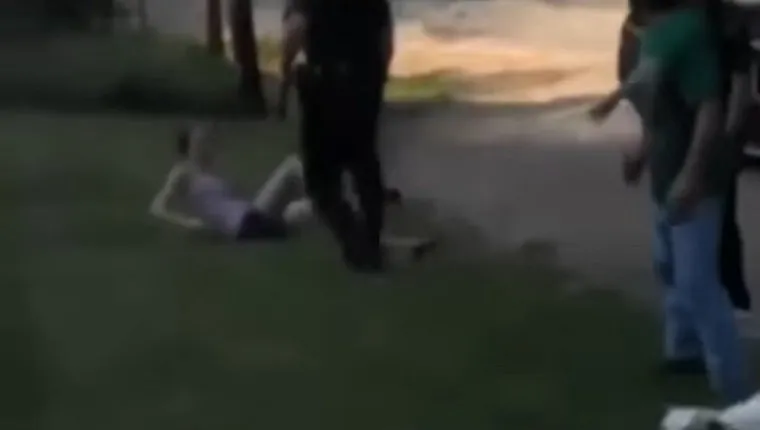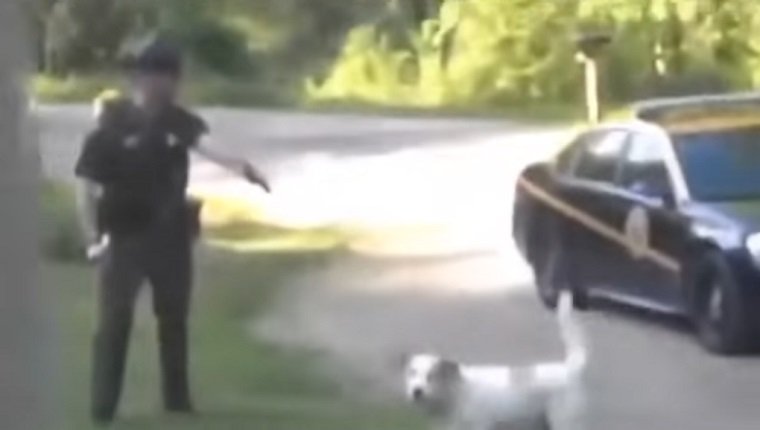West Virginia state trooper Seth Cook and his partner responded to a call to break up a fight between neighbors in May 2015. It was a routine call, and no arrests were made for that incident, but as Cook left the property, the family dog, Buddy, who was tied to a tree, approached him with his tail wagging. That’s when Cook pulled out his gun and pointed it at Buddy’s head.

Tiffanie Hupp, Buddy’s owner, heard Cook tell her to get her dog under control. After seeing the gun in his hand pointed at her dog, Hupp stood in between Cook and Buddy. Her son, Riley, was playing nearby, and she couldn’t let the officer kill the family dog, especially in front of her kid. But instead of backing down, Cook shoved Hupp to the ground before pressing her to the police car and arresting her for obstruction. Hupp’s husband recorded the incident.
The officer then entered the family’s home without a warrant and confiscated every recording device he could find, including all phones and tablets, even the one that recorded the altercation. He would later testify that he wasn’t afraid of the dog but was just following his training, which is to kill every dog that approaches him while on duty, even if they don’t present a threat.
Next began a rather strange court case. Hupp was provided with a public defender named Lori Snodgrass who insisted she take a plea deal. Hupp knew she had done nothing wrong, so she refused. Later it was found that Snodgrass was married to state trooper Seth Cook’s boss. This conflict of interest wasn’t disclosed to Hupp.
Another attorney that heard about Hupp’s story took up the case and after about a month of calls to the police, the family’s devices were returned, but only after Hupp was forced to provide the password for her phone. Finally, the video of the incident was played before a jury and Hupp was immediately found not guilty of obstruction.
Now Hupp is suing Cook, his partner, and the West Virginia State Police for violating her Fourth and Fourteenth Amendment rights, the use of excessive force, unlawful search and seizure, malicious prosecution, the intentional infliction of emotional distress, battery, slander, and negligent training of a police officer who was told it was okay to kill a dog that posed no threat and was restrained on the owner's property. [caption id="attachment_48165" align="alignnone" width="680"]
 (Picture Credit: YouTube - Photography is Not a Crime)[/caption]
Hupp's son, Riley, is also emotionally traumatized from seeing an officer point a gun at his best friend and shove his mother to the ground for trying to protect him. He's now terrified of police officers and requires counseling. Hupp is hoping to be compensated for the legal fees, emotional distress, and trauma to her son caused by the incident. The Animal Legal Defense Fund is also working with sheriff's offices nationwide to make sure canine encounter training is mandatory.
If you want to contact the West Virginia State Police to tell them what you think of how this officer handled this situation, the contact information is HERE.
What do you think? Does Hupp deserve to be compensated for all the problems cause by Cook's actions? Are you outraged that an officer could kill a dog that poses no threat? What would you do if a cop pointed a gun at your dog? Let us know in the comments below.
Related Articles:
Cop Kills Family Dog At 5 Year Old’s Birthday Party
Dear Police: Please Do NOT Shoot My Dog
Save
Save
(Picture Credit: YouTube - Photography is Not a Crime)[/caption]
Hupp's son, Riley, is also emotionally traumatized from seeing an officer point a gun at his best friend and shove his mother to the ground for trying to protect him. He's now terrified of police officers and requires counseling. Hupp is hoping to be compensated for the legal fees, emotional distress, and trauma to her son caused by the incident. The Animal Legal Defense Fund is also working with sheriff's offices nationwide to make sure canine encounter training is mandatory.
If you want to contact the West Virginia State Police to tell them what you think of how this officer handled this situation, the contact information is HERE.
What do you think? Does Hupp deserve to be compensated for all the problems cause by Cook's actions? Are you outraged that an officer could kill a dog that poses no threat? What would you do if a cop pointed a gun at your dog? Let us know in the comments below.
Related Articles:
Cop Kills Family Dog At 5 Year Old’s Birthday Party
Dear Police: Please Do NOT Shoot My Dog
Save
Save










